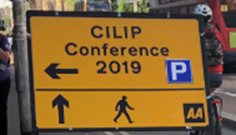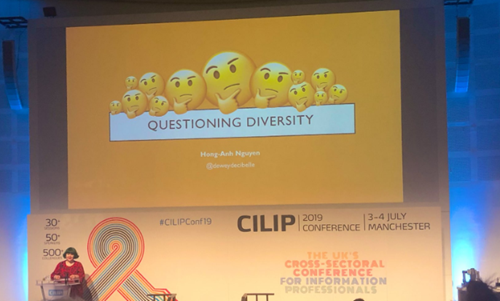This was my first time at a CILIP conference, but having been to HLG last year and It’s Great up North earlier this I had some idea of what to expect from a library and information conference.

However, I wasn’t quite prepared for just how big the CILIP conference would be… it even had its own road sign!
After meeting new colleagues in the CILIP conference welcome area, chatting to exhibitors and catching up with colleagues from YOHHLNet it was time for the conference to begin.
The first keynote speaker was Kriti Sharma, who spoke about using Artificial Intelligence (AI) to help create a fairer world. Kriti spoke about mistakes which had been made in AI, including the biases created by algorithms and issues around diversity. Kriti argued that there is a lot of potential and opportunity to use AI and that we can learn from the mistakes of the digital world to improve access for all.
It was soon time to head to our first seminar session - for me this was the ‘25 years of Libraries Change Lives’ seminar. This session focused on two Libraries Change Lives award-winning initiatives, the first being The Mitchell Library Homeless In-Reach project with Citizen’s Advice Bureau. Dan Monks and Iain Riley (Glasgow Libraries) spoke about how the initiative had first started to take shape after a chance conversation with a member of the Council. With an open-door policy the library had seen an increase in homelessness and the Citizen’s Advice Bureau needed new premises within the city so the two services came together to collaborate. Through their partnership they have helped to change the lives of some of the library’s customers.
The second award-winning initiative was Norfolk Libraries Healthy Libraries. Jan Holden (Norfolk Libraries) spoke about how Norfolk Libraries had worked with local public-health teams to develop their libraries into ‘healthy libraries’. Library staff were able to use the daily contact they had with customers to promote healthy lifestyles. The key message I took away from Jan’s presentation was ‘things can be piloted and abandoned if they don’t work. Learn quickly and move on!’
After lunch it was time for the second keynote of the conference, Liz Jolly (Chief Librarian, British Library) ‘Librarianship and identity: Professionalism in a changing world’. Within the keynote Liz spoke about her own career, which I found particularly interesting.
For the second seminar session of the day I chose to attend ‘Innovation in public libraries’ where I found out about the LGBT archive collections at Manchester Central Library; 100% Digital Leeds (a cross sector collaboration led by Leeds Libraries) exploring the potential of using open geographic intelligence with library data; and how Kirklees Libraries have used creative engagement to develop their library service.
The final seminar session of the day for me was ‘Media and information literacy’. In this session I found out about
• How the UK government is tackling disinformation though media and information literacy
• The themes to address when developing digital literacies
• Digital wellbeing of children/young people and those that care for/support them.
I also learned about the ‘Be Media Smart’ public awareness campaign which was launched in Ireland in 2019. The campaign aimed to encourage people of all ages to stop, look and check that the information they see, read or hear is reliable.
Day two started with keynote 3 - Questioning diversity. Hong-Anh Nguyen (The Kings Fund) drew on her personal and professional experiences to highlight what libraries need to understand in order to move beyond good intentions and become an inclusive and diverse profession.

Keynote 3 - Questioning Diversity. Hong-Anh Nguyen
I was keen to find out more about diversity and inclusion within the profession, so I went along to the ‘Diversity in the profession’ session. In this session, members of the panel shared their personal and professional experiences whilst anonymous experiences from the wider profession were shared on a presentation. This session certainly gave me food for thought.
My final session of the day was the Impact and influence workshop. In this session Kay Grieves (University of Sunderland) shared her bespoke engagement and impact model and how this has helped to demonstrate impact and value to academic staff and the University Executive. Anthony Hopkins (Library, Heritage and Adult Education Service, London Borough of Merton) spoke about his personal career journey from Library Assistant to Head of Service and highlighted the importance of building influence within a political environment.
Before the conference drew to a close there was time for one more keynote ‘Libraries as a place: how public libraries can transform themselves as a third place for all’ - Aat Vos (in partnership with Designing Libraries). Aat spoke about libraries becoming social places, the impact of this on the traditional library service and how libraries can transform into third places for all.
My aim for attending the CILIP conference was to try and broaden my knowledge of the wider library sector, outside of health. I feel that I achieved this and I’m very grateful to YOHHLNet for allowing me the opportunity to attend.
Natasha Craigs
Library Assistant, The Mid Yorkshire Hospitals NHS Trust

